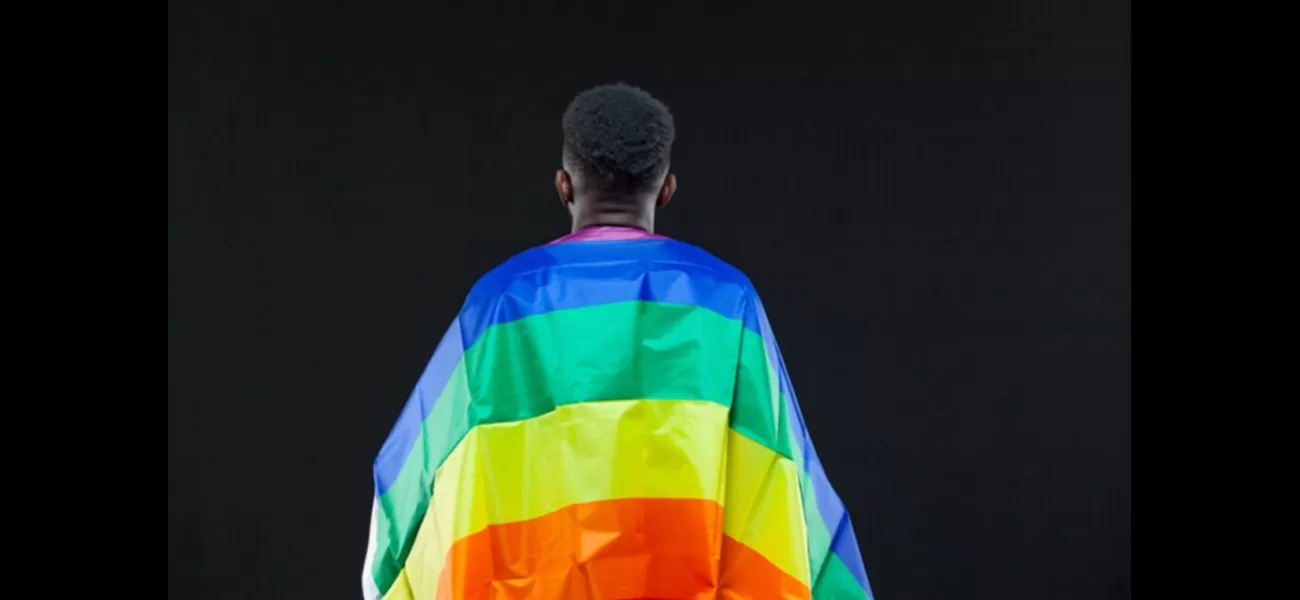A gay man from Ghana, who sought refuge in the United States, has been granted asylum.
In 2020, the truck driver escaped Ghana and traveled through ten countries before reaching the U.S. border.
April 18th 2024.

There was once a man, Mr. B, who faced a terrible attack in his home country of Ghana. Despite his efforts to hide his true identity from his loved ones, he was brutally assaulted by a gang in 2019. This horrific event forced him to flee his home and seek refuge in North America, in hopes of finding freedom and acceptance.
The journey was long and dangerous, as he traveled through 10 different countries before finally reaching the U.S. border in May 2020. Unfortunately, upon arrival, he was detained for three months and then transferred to the Stewart Detention Facility in Georgia. There, he was housed in a dorm with over 60 other men, without proper COVID-19 protections in place. It wasn't until Professor Claire Thomas, a family friend of a friend, took on his case through the Asylum Clinic at New York Law School, that Mr. B's situation began to change for the better.
Thanks to the collaborative efforts of the clinic, the Georgia Latino Alliance for Human Rights, and the Envision Freedom Fund, Mr. B's $15,000 bond was paid, and he was able to travel by bus from Atlanta to New York. It was there that he finally met Thomas in person, in late August of 2020, to sign the necessary documents for his asylum case. Due to the ongoing pandemic and immigration court closures, Mr. B's hearing date was not until three and a half years later, in early 2024. Fortunately, he was granted asylum and was finally able to start his life anew.
Thomas is now working to help Mr. B obtain a commercial driver's license so he can return to work. She hopes that by sharing his story, he will find a company willing to sponsor him and help him get back on his feet. In Ghana, Mr. B had completed a two-year apprenticeship to become a truck driver and also learned how to repair his own truck. Thomas believes that with the right support, he can continue this career in the U.S.
However, the fight for LGBTQ+ rights is far from over in Ghana. In March of 2024, the country's parliament passed a controversial bill that criminalizes homosexuality. Under this new law, those who engage in LGBTQ+ sexual acts could face imprisonment for up to three years, while those who promote or support LGBTQ+ activities could face even harsher penalties. This bill was first introduced in 2021 and received support from religious and traditional leaders before being passed in February of 2024.
This is not the first case of a Ghanaian seeking asylum in the U.S. due to their sexual orientation. In 2020, two law students from West Virginia University College of Law, Paige Beddow and Scott A. Cain, fought for a similar case and were successful. They argued that a gay man who had fled Ghana after being assaulted and threatened with death should be granted asylum in the U.S. The judges initially rejected the case, stating that it was only one instance of violence and that the man could avoid prosecution by keeping his sexuality a secret. However, U.S. Circuit Judge L. Felipe Restrepo overturned this decision and urged the immigration court to reconsider, stating that the man had endured a horrific attack and deserved protection.
Now that Mr. B has been granted asylum and is free to live his life, he is relieved and excited for what the future holds. He hopes to start dating and find a job that he loves. He also wants his story to bring awareness to the struggles faced by the LGBTQ+ community in Ghana. He wants the world to know that queer Ghanaians have no life or voice in their own country and that even the smallest mistake could result in their disappearance.
Recently, Mr. B attended his first-ever Pride celebration, and he was in awe of the freedom and acceptance he witnessed. He said the atmosphere was great and that he noticed people were free to be themselves without fear or judgment. He is grateful to be in a country where he can finally live as his true self and hopes that his story will inspire others to fight for LGBTQ+ rights in Ghana and around the world.
The journey was long and dangerous, as he traveled through 10 different countries before finally reaching the U.S. border in May 2020. Unfortunately, upon arrival, he was detained for three months and then transferred to the Stewart Detention Facility in Georgia. There, he was housed in a dorm with over 60 other men, without proper COVID-19 protections in place. It wasn't until Professor Claire Thomas, a family friend of a friend, took on his case through the Asylum Clinic at New York Law School, that Mr. B's situation began to change for the better.
Thanks to the collaborative efforts of the clinic, the Georgia Latino Alliance for Human Rights, and the Envision Freedom Fund, Mr. B's $15,000 bond was paid, and he was able to travel by bus from Atlanta to New York. It was there that he finally met Thomas in person, in late August of 2020, to sign the necessary documents for his asylum case. Due to the ongoing pandemic and immigration court closures, Mr. B's hearing date was not until three and a half years later, in early 2024. Fortunately, he was granted asylum and was finally able to start his life anew.
Thomas is now working to help Mr. B obtain a commercial driver's license so he can return to work. She hopes that by sharing his story, he will find a company willing to sponsor him and help him get back on his feet. In Ghana, Mr. B had completed a two-year apprenticeship to become a truck driver and also learned how to repair his own truck. Thomas believes that with the right support, he can continue this career in the U.S.
However, the fight for LGBTQ+ rights is far from over in Ghana. In March of 2024, the country's parliament passed a controversial bill that criminalizes homosexuality. Under this new law, those who engage in LGBTQ+ sexual acts could face imprisonment for up to three years, while those who promote or support LGBTQ+ activities could face even harsher penalties. This bill was first introduced in 2021 and received support from religious and traditional leaders before being passed in February of 2024.
This is not the first case of a Ghanaian seeking asylum in the U.S. due to their sexual orientation. In 2020, two law students from West Virginia University College of Law, Paige Beddow and Scott A. Cain, fought for a similar case and were successful. They argued that a gay man who had fled Ghana after being assaulted and threatened with death should be granted asylum in the U.S. The judges initially rejected the case, stating that it was only one instance of violence and that the man could avoid prosecution by keeping his sexuality a secret. However, U.S. Circuit Judge L. Felipe Restrepo overturned this decision and urged the immigration court to reconsider, stating that the man had endured a horrific attack and deserved protection.
Now that Mr. B has been granted asylum and is free to live his life, he is relieved and excited for what the future holds. He hopes to start dating and find a job that he loves. He also wants his story to bring awareness to the struggles faced by the LGBTQ+ community in Ghana. He wants the world to know that queer Ghanaians have no life or voice in their own country and that even the smallest mistake could result in their disappearance.
Recently, Mr. B attended his first-ever Pride celebration, and he was in awe of the freedom and acceptance he witnessed. He said the atmosphere was great and that he noticed people were free to be themselves without fear or judgment. He is grateful to be in a country where he can finally live as his true self and hopes that his story will inspire others to fight for LGBTQ+ rights in Ghana and around the world.
[This article has been trending online recently and has been generated with AI. Your feed is customized.]
[Generative AI is experimental.]
0
0
Submit Comment





